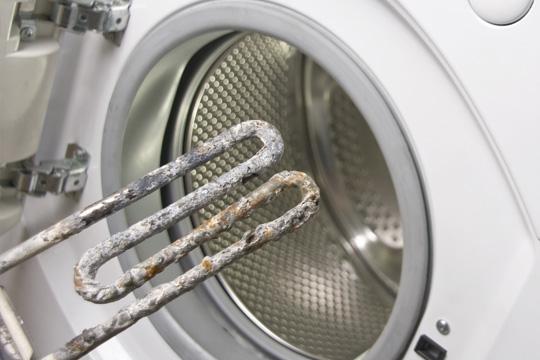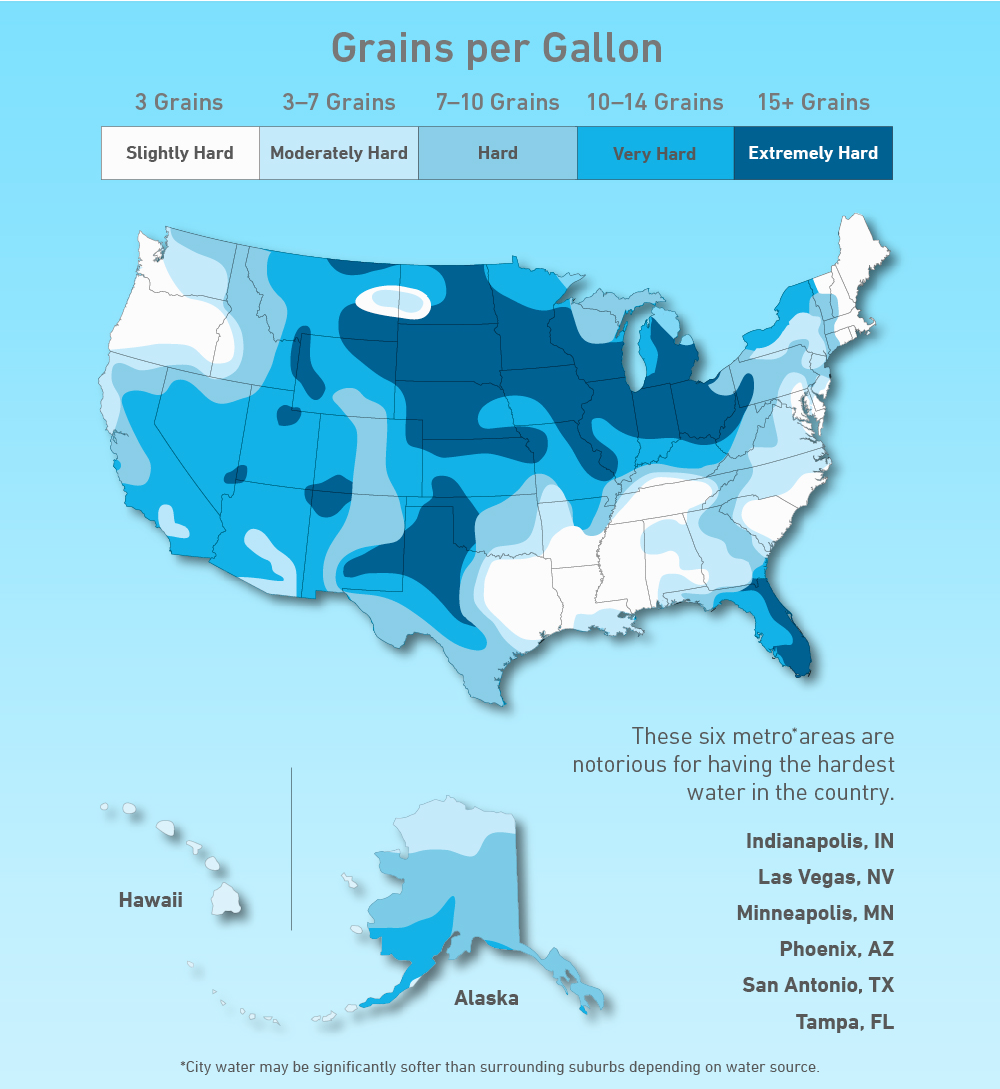What is Water Hardness?
Water hardness is caused by compounds of calcium and magnesium, and by a variety of other metals. General guidelines for classification of waters are: 0 to 60 mg/L (milligrams per liter) as calcium carbonate is classified as soft; 61 to 120 mg/L as moderately hard; 121 to 180 mg/L as hard; and more than 180 mg/L as very hard.
HARD VS. SOFT: Which is better?
Hard water needs more soap to make a good, rich lather in the tub or shower. This doesn’t matter much when it’s used to do the family laundry, as most modern detergents contain water softeners. However, excessively hard water may cost you money on wear and tear. It is estimated that hard water costs the average American family $140 a year by shortening fabric life. It’s tough on your hands as well; as a result, you may invest a few extra dollars in there for hand creams. What’s more, it can also cause refrigerators to clog: the ice maker or water tap in the fridge may have clogged parts, shortening the lifespan of the unit.

On the other hand, soft water is smoother and enjoyable to drink. People often say they find hard water to have a different ‘flavor’ – while soft water does not have any flavor at all. The fact that soft water has a more neutral taste to it means it can be enjoyed by a wide range of people, regardless of their tastes and preferences. It also means it won’t affect the taste of other water-based drinks, such as tea, coffee or juice.
US Water Source Hardness Location

As you can see from the map above, almost all water in the USA is hard. Among them, there are six cities with the hardest water:
- Indianapolis, IN
- Las Vegas, NV
- Minneapolis, MN
- Phoenix, AZ
- San Antonio, TX
- Tampa, FL
The US Geological Survey has identified Florida, Indiana, Wisconsin, Utah, New Mexico, and Arizona as states whose untreated groundwater is very hard. Moderately hard water – again, untreated – is found in Montana, Idaho, Nevada, California, Texas, Oklahoma, Kansas, Illinois, Michigan, and Ohio.
Solution to Hard Water in an Ice and Water Dispenser of a Refrigerator
Hard water contains large amounts of dissolved minerals. These minerals not only affect the taste and appearance of your ice and drinking water, but the deposits left behind by hard water can foul up the water lines and working parts of your fridge’s ice and water dispenser.
Most refrigerators with the water and ice function come with a preinstalled water filter that removes impurities, including the mineral deposits from hard water. Over time, however, the minerals build up in the filter, making it ineffective. Replace the filter regularly according to the manufacturer’s instructions or about every six months to keep foul-tasting hard water minerals out of the ice and water. If the ice/water maker does not have a filter, you can install one by cutting into the water line that supplies the ice/water. Alternately, you can install a whole-house water filter or softener that removes minerals from hard water.
In addition, most refrigerators require deep cleaning every six to 12 months and weekly cleaning of the dispenser nozzles, but you may need to clean more often depending on how quickly limescale builds.
Clatterans Refrigerator Water Filters ON SALE, Only $54.99 for 3-Pack


 (2 votes, average: 4.50 out of 5)
(2 votes, average: 4.50 out of 5)




… [Trackback]
[…] Here you can find 64318 additional Info to that Topic: blog.clatterans.com/health/hard-and-soft-water-across-the-us/ […]
… [Trackback]
[…] Read More Info here on that Topic: blog.clatterans.com/health/hard-and-soft-water-across-the-us/ […]
… [Trackback]
[…] Read More Information here to that Topic: blog.clatterans.com/health/hard-and-soft-water-across-the-us/ […]
… [Trackback]
[…] Find More to that Topic: blog.clatterans.com/health/hard-and-soft-water-across-the-us/ […]
… [Trackback]
[…] Read More to that Topic: blog.clatterans.com/health/hard-and-soft-water-across-the-us/ […]
… [Trackback]
[…] Find More on that Topic: blog.clatterans.com/health/hard-and-soft-water-across-the-us/ […]
… [Trackback]
[…] Find More on that Topic: blog.clatterans.com/health/hard-and-soft-water-across-the-us/ […]
… [Trackback]
[…] Find More here on that Topic: blog.clatterans.com/health/hard-and-soft-water-across-the-us/ […]
… [Trackback]
[…] Find More on that Topic: blog.clatterans.com/health/hard-and-soft-water-across-the-us/ […]
… [Trackback]
[…] Find More on that Topic: blog.clatterans.com/health/hard-and-soft-water-across-the-us/ […]
… [Trackback]
[…] Info to that Topic: blog.clatterans.com/health/hard-and-soft-water-across-the-us/ […]
… [Trackback]
[…] Read More to that Topic: blog.clatterans.com/health/hard-and-soft-water-across-the-us/ […]
… [Trackback]
[…] Find More here on that Topic: blog.clatterans.com/health/hard-and-soft-water-across-the-us/ […]
… [Trackback]
[…] Find More here to that Topic: blog.clatterans.com/health/hard-and-soft-water-across-the-us/ […]
… [Trackback]
[…] Find More to that Topic: blog.clatterans.com/health/hard-and-soft-water-across-the-us/ […]
… [Trackback]
[…] Find More to that Topic: blog.clatterans.com/health/hard-and-soft-water-across-the-us/ […]
… [Trackback]
[…] Read More here to that Topic: blog.clatterans.com/health/hard-and-soft-water-across-the-us/ […]
… [Trackback]
[…] Find More on that Topic: blog.clatterans.com/health/hard-and-soft-water-across-the-us/ […]
… [Trackback]
[…] Read More on on that Topic: blog.clatterans.com/health/hard-and-soft-water-across-the-us/ […]
… [Trackback]
[…] There you can find 74223 additional Info to that Topic: blog.clatterans.com/health/hard-and-soft-water-across-the-us/ […]
… [Trackback]
[…] Find More to that Topic: blog.clatterans.com/health/hard-and-soft-water-across-the-us/ […]